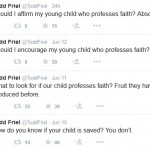In 2002, Baptism missionary and preacher Paul Washer preached what’s often known as the “Shocking Youth Message,” to a group of Baptist young people about true and false conversions. In this message, Washer rejects the “accept Jesus into your heart” mentality that captivates so many baptist churches. He rightly argues that repentance is a daily reality for the Christian, not a one time event.
Yet, for all that Washer gets right in this message, there are some glaring issues. One of those is his use of Matthew 7. Washer argues that we need to be constantly looking at ourselves to evaluate the fruit of our lives, and the reality of our conversion. He says that many are going to be damned who profess to believe in Christ, and who believe themselves to be Christians. Since this message was preached, Matthew 7 seems to be a favorite text for a certain group of preachers who are convinced that most professing Christians are not actually saved. This type of introspective fruit-checking can be damaging to one’s faith, especially as Christians often see their sin and struggles more than the fruits that God is producing in them. Washer’s approach causes the Christian to look inward for assurance, rather than to the objective means of grace. The most extreme forms of this type of theology result in a stance of skepticism toward anyone who professes the faith. See the cult called The Church of Wells, for example.
The utilization of Matthew 7 for this purpose is eisegetical. When examining the context of this passage, it becomes apparent that it is not a call for obsessive self-examination. Part of the problem here is that most translations place a break between 7:20 and 7:21. When Matt. 7:21- 23 is read in isolation from its earlier context, Washer’s interpretation seems warranted. The text reads:
“Not everybody who says to me, ‘Lord, Lord,’ will get into the kingdom of heaven. Only those who do the will of my Father who is in heaven will enter. On the Judgment Day, many people will say to me, ‘Lord, Lord, didn’t we prophesy in your name and expel demons in your name and do lots of miracles in your name?’Then I’ll tell them, ‘I’ve never known you. Get away from me, you people who do wrong.’”
So far, Washer’s approach looks like the clear meaning of this text. Many think they are Christians, but will be condemned for eternity and rejected by Christ. The differentiating factor is the manner of life lived. But, look at the previous section:
“Watch out for false prophets. They come to you dressed like sheep, but inside they are vicious wolves. You will know them by their fruit. Do people get bunches of grapes from thorny weeds, or do they get figs from thistles? In the same way, every good tree produces good fruit, and every rotten tree produces bad fruit. A good tree can’t produce bad fruit. And a rotten tree can’t produce good fruit. Every tree that doesn’t produce good fruit is chopped down and thrown into the fire. Therefore, you will know them by their fruit.Watch out for false prophets. They come to you dressed like sheep, but inside they are vicious wolves. You will know them by their fruit. Do people get bunches of grapes from thorny weeds, or do they get figs from thistles? In the same way, every good tree produces good fruit, and every rotten tree produces bad fruit. A good tree can’t produce bad fruit. And a rotten tree can’t produce good fruit. Every tree that doesn’t produce good fruit is chopped down and thrown into the fire. Therefore, you will know them by their fruit.”
When looking at this section of the text, its clear that Jesus isn’t talking about checking one’s own fruit, but checking the fruit of public teachers. These people are those who are “false prophets,” and they plead before God that they “prophesied in your name,” and that they “performed miracles.” This is not a call for introspection but for discernment. When someone claims to be a prophet of God, we must examine their fruit. That fruit doesn’t only include good works, but the content of their teaching/preaching.
This text is so applicable today with the multitude of false teachers. Think about someone like Benny Hinn. Like Jesus explains, he prophesies in the name of God, and he performs miracles in the name of God. Yet, the fruit he bears demonstrates that he is a false prophet. He teaches that there are nine persons of the Trinity, utters prophesies that never come to pass, and performs “miracles,” which cannot be verified. These are the bad fruits that we are to look out for.
It is true that the true believer must have repentance, and that God works good in the lives of all who are his. Yet none of these things are the grounding of one’s assurance. The only foundation for our assurance is the work of Christ on behalf of sinners.
For further resources on Paul Washer, see these two podcasts that I have recorded on his theology: A Critique of the Theology of Paul Washer, and The Preparationism of Paul Washer.











